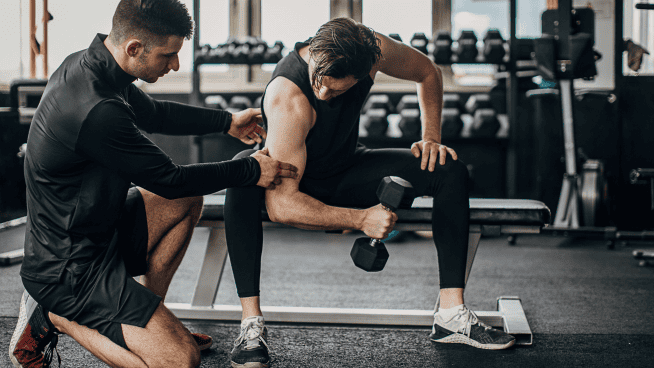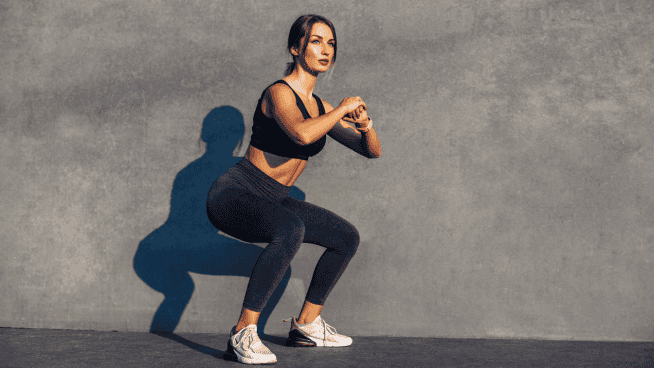What’s Up With Elite NBA Players Losing Weight?
If you’re an NBA player and you didn’t attempt to lose weight during the off-season, what the heck were you doing? It seems like everyone, from LeBron James to Carmelo Anthony to Anthony Bennett, was looking to shed pounds this summer, whether to improve their performance on the court or because their wives made them join the vegan bandwagon. Whatever the case, the Internet took notice.
Whoa! LeBron lost 400 pounds! Dwyane Wade is on the Paelo diet? That’s so 2008! Kevin Love looks like a Gap model!
Those are all real things that real people wrote—probably. Which brings us to the question of the day: Why?
Losing weight to improve athletic performance is no revelation, but for athletes who are already in ridiculous shape, the goal of losing weight can leave us scratching our heads. LeBron James has dominated NBA courts for 11 seasons, partly because of his massive frame. Why did he feel the need to drop weight? Kevin Love has averaged a bajillion rebounds per game for seven years, so what gives?
Turns out, “losing weight” is a more complex concept than it at first appears. The aforementioned NBA players aren’t simply losing pounds. They are adding muscle and eliminating body fat.
James publicly stated that his weight loss had nothing to do with basketball. Each off-season, he poses a challenge to himself, and this year’s challenge involved cutting sugar and dairy out of his diet entirely. According to Denver Nuggets strength and conditioning coach Steve Hess, the benefits to his body should be major. Hess said, “Can [losing weight] extend someone’s career? Yes, but only if he loses the right weight.”
Losing the “right weight,” according to Hess, is when an athlete sheds excess body fat while maintaining, or even adding, muscle. LeBron reportedly lost 10 to 15 pounds while clearly keeping the muscle that allows him to power to the hoop and absorb physical pounding. Though he hasn’t admitted it, the weight James carried last year may have hurt his game, and he was looking to get lighter and quicker on the court.
“If you lose weight, and it’s body fat that you lose, what ends up happening is you put a bigger engine in a smaller car,” Hess said. “As you get older, you want to be as efficient as possible, and if you have to move less weight with the same engine, absolutely, do it all day.”
James’s new teammate Kevin Love is also looking slim. Toward the end of last season he was down to 243 pounds, the lightest he’s been since high school, and down from the 270 pounds he carried as a rookie. Summer workouts with Russell Westbrook helped, as did a diet focused on chicken, fish and steak.
But Hess warns that just eating “healthy foods” won’t help you perform at a high level. “As a performance athlete, you need a lot of carbohydrates,” he said. “You also need protein and you also need fats. But, if you say, for example, ‘I’m taking all carbohydrates and all fats out of my diet. I’m just eating a high-protein diet,’ you will utilize fat a lot faster, but you will also utilize muscle.”
Without carbs, the performance athlete’s fuel, it will be almost impossible for a basketball player to endure a nine-month season, according to Hess. When your body is burning muscle instead of fat, he said, “the ability to create force changes.”
They New York Post reported that Carmelo Anthony’s motivation for dropping pounds was to get “speedier in the triangle offense and play with an athleticism similar to his rookie year, when he weighed 230 pounds.” Losing body fat was a major part of that.
Hess harkens back to 2007, when Nene, then a Denver Nugget, was coming off a major injury. He dropped his weight from 268 to 250 pounds and lowered his body fat to 7 percent without losing strength. “He was a machine,” said Hess. “His performance was amazing.”
For guys like James, Love and Anthony, it’s not about losing weight, really; it’s about cutting unnecessary body fat to move better on the court and take stress off those precious joints that make you who you are while maintaining your superior strength. And when the leaders of the sport start doing it, the rest usually follow.
“You must understand, this is a performance athlete,” Hess said. “How they look is secondary to how they perform.”
RECOMMENDED FOR YOU
MOST POPULAR
What’s Up With Elite NBA Players Losing Weight?
If you’re an NBA player and you didn’t attempt to lose weight during the off-season, what the heck were you doing? It seems like everyone, from LeBron James to Carmelo Anthony to Anthony Bennett, was looking to shed pounds this summer, whether to improve their performance on the court or because their wives made them join the vegan bandwagon. Whatever the case, the Internet took notice.
Whoa! LeBron lost 400 pounds! Dwyane Wade is on the Paelo diet? That’s so 2008! Kevin Love looks like a Gap model!
Those are all real things that real people wrote—probably. Which brings us to the question of the day: Why?
Losing weight to improve athletic performance is no revelation, but for athletes who are already in ridiculous shape, the goal of losing weight can leave us scratching our heads. LeBron James has dominated NBA courts for 11 seasons, partly because of his massive frame. Why did he feel the need to drop weight? Kevin Love has averaged a bajillion rebounds per game for seven years, so what gives?
Turns out, “losing weight” is a more complex concept than it at first appears. The aforementioned NBA players aren’t simply losing pounds. They are adding muscle and eliminating body fat.
James publicly stated that his weight loss had nothing to do with basketball. Each off-season, he poses a challenge to himself, and this year’s challenge involved cutting sugar and dairy out of his diet entirely. According to Denver Nuggets strength and conditioning coach Steve Hess, the benefits to his body should be major. Hess said, “Can [losing weight] extend someone’s career? Yes, but only if he loses the right weight.”
Losing the “right weight,” according to Hess, is when an athlete sheds excess body fat while maintaining, or even adding, muscle. LeBron reportedly lost 10 to 15 pounds while clearly keeping the muscle that allows him to power to the hoop and absorb physical pounding. Though he hasn’t admitted it, the weight James carried last year may have hurt his game, and he was looking to get lighter and quicker on the court.
“If you lose weight, and it’s body fat that you lose, what ends up happening is you put a bigger engine in a smaller car,” Hess said. “As you get older, you want to be as efficient as possible, and if you have to move less weight with the same engine, absolutely, do it all day.”
James’s new teammate Kevin Love is also looking slim. Toward the end of last season he was down to 243 pounds, the lightest he’s been since high school, and down from the 270 pounds he carried as a rookie. Summer workouts with Russell Westbrook helped, as did a diet focused on chicken, fish and steak.
But Hess warns that just eating “healthy foods” won’t help you perform at a high level. “As a performance athlete, you need a lot of carbohydrates,” he said. “You also need protein and you also need fats. But, if you say, for example, ‘I’m taking all carbohydrates and all fats out of my diet. I’m just eating a high-protein diet,’ you will utilize fat a lot faster, but you will also utilize muscle.”
Without carbs, the performance athlete’s fuel, it will be almost impossible for a basketball player to endure a nine-month season, according to Hess. When your body is burning muscle instead of fat, he said, “the ability to create force changes.”
They New York Post reported that Carmelo Anthony’s motivation for dropping pounds was to get “speedier in the triangle offense and play with an athleticism similar to his rookie year, when he weighed 230 pounds.” Losing body fat was a major part of that.
Hess harkens back to 2007, when Nene, then a Denver Nugget, was coming off a major injury. He dropped his weight from 268 to 250 pounds and lowered his body fat to 7 percent without losing strength. “He was a machine,” said Hess. “His performance was amazing.”
For guys like James, Love and Anthony, it’s not about losing weight, really; it’s about cutting unnecessary body fat to move better on the court and take stress off those precious joints that make you who you are while maintaining your superior strength. And when the leaders of the sport start doing it, the rest usually follow.
“You must understand, this is a performance athlete,” Hess said. “How they look is secondary to how they perform.”










